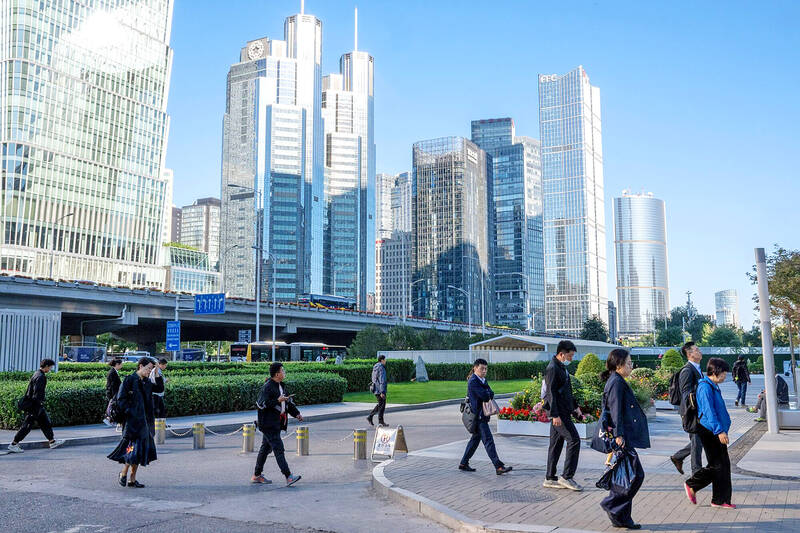China’s economic planning agency yesterday outlined details of measures aimed at boosting the economy, but refrained from major spending initiatives.
The piecemeal nature of the plans announced yesterday appeared to disappoint investors who were hoping for bolder moves, and the Shanghai Composite Index gave up a 10 percent initial gain as markets reopened after a weeklong holiday to end 4.59 percent higher, while Hong Kong’s Hang Seng Index dived 9.41 percent.
Chinese National Development and Reform Commission Chairman Zheng Shanjie (鄭珊潔) said the government would frontload 100 billion yuan (US$14.2 billion) in spending from the government’s budget for next year in addition to another 100 billion yuan for construction projects.

Photo: Bloomberg
The scale of spending overall was well below the multitrillion yuan levels that analysts said might be expected.
Zheng said China was still on track to attain its full-year economic growth target of about 5 percent, but he acknowledged the economy faces difficulties and an increasingly “more complex and extreme” global environment.
In a note, UBS chief China economist Wang Tao (王濤) said that the market was “likely expecting a significant fiscal stimulus.”
A modest package of 1.5 trillion to 2 trillion yuan is more reasonable to expect in the near term, she said, with another 2 trillion to 3 trillion yuan next year.
Late last month, China unveiled a monetary stimulus package including cuts to mortgage rates and in the amount of reserves required to keep on deposit with the central bank.
Those and other measures were the most aggressive efforts so far to try to pull the property industry out of the doldrums and spur faster growth.
The commission said the new measures would focus on boosting investment and spending, and supporting small and medium-sized businesses that operate at a disadvantage to large, state-corporations.
However, much of the information focused on technical issues, such as payment regulations, management of projects and deployment of bonds for financing.
Separately, Chinese drinkers might have to pay more for Remy Martin and other European brandies after the government yesterday announced provisional tariffs of 30.6 to 39 percent on those liquors, four days after most EU countries approved duties on China-made electric vehicles (EVs).
The tit-for-tat move potentially gives Chinese negotiators leverage in talks with the EU on reducing or eliminating the tariffs of up to 35.3 percent on Chinese EVs, which take effect at the end of this month.
The brandy tariffs are provisional and require importers to make a deposit with the Chinese customs for the amount of the tariff, starting on Friday.
The announcement followed a preliminary finding by the Chinese Ministry of Commerce in late August that European brandy was being dumped in China, threatening “substantial damage” to domestic producers.
The brandy probe mainly targeted French makers of Cognac and similar spirits such as Armagnac. France has supported the investigation into Chinese-made EVs, while Germany, whose automakers fear retaliation in the Chinese market, has opposed it.
The provisional tariffs vary by brand, similar to the EU duties on EVs made in China. For example, Martell products face a 30.6 percent tariff versus 38.1 percent for Remy Martin and 39 percent for Hennessey.
The tariffs are being imposed on dozens of companies, including some Spanish producers.

Intel Corp chief executive officer Lip-Bu Tan (陳立武) is expected to meet with Taiwanese suppliers next month in conjunction with the opening of the Computex Taipei trade show, supply chain sources said on Monday. The visit, the first for Tan to Taiwan since assuming his new post last month, would be aimed at enhancing Intel’s ties with suppliers in Taiwan as he attempts to help turn around the struggling US chipmaker, the sources said. Tan is to hold a banquet to celebrate Intel’s 40-year presence in Taiwan before Computex opens on May 20 and invite dozens of Taiwanese suppliers to exchange views

Application-specific integrated circuit designer Faraday Technology Corp (智原) yesterday said that although revenue this quarter would decline 30 percent from last quarter, it retained its full-year forecast of revenue growth of 100 percent. The company attributed the quarterly drop to a slowdown in customers’ production of chips using Faraday’s advanced packaging technology. The company is still confident about its revenue growth this year, given its strong “design-win” — or the projects it won to help customers design their chips, Faraday president Steve Wang (王國雍) told an online earnings conference. “The design-win this year is better than we expected. We believe we will win

Chizuko Kimura has become the first female sushi chef in the world to win a Michelin star, fulfilling a promise she made to her dying husband to continue his legacy. The 54-year-old Japanese chef regained the Michelin star her late husband, Shunei Kimura, won three years ago for their Sushi Shunei restaurant in Paris. For Shunei Kimura, the star was a dream come true. However, the joy was short-lived. He died from cancer just three months later in June 2022. He was 65. The following year, the restaurant in the heart of Montmartre lost its star rating. Chizuko Kimura insisted that the new star is still down

While China’s leaders use their economic and political might to fight US President Donald Trump’s trade war “to the end,” its army of social media soldiers are embarking on a more humorous campaign online. Trump’s tariff blitz has seen Washington and Beijing impose eye-watering duties on imports from the other, fanning a standoff between the economic superpowers that has sparked global recession fears and sent markets into a tailspin. Trump says his policy is a response to years of being “ripped off” by other countries and aims to bring manufacturing to the US, forcing companies to employ US workers. However, China’s online warriors